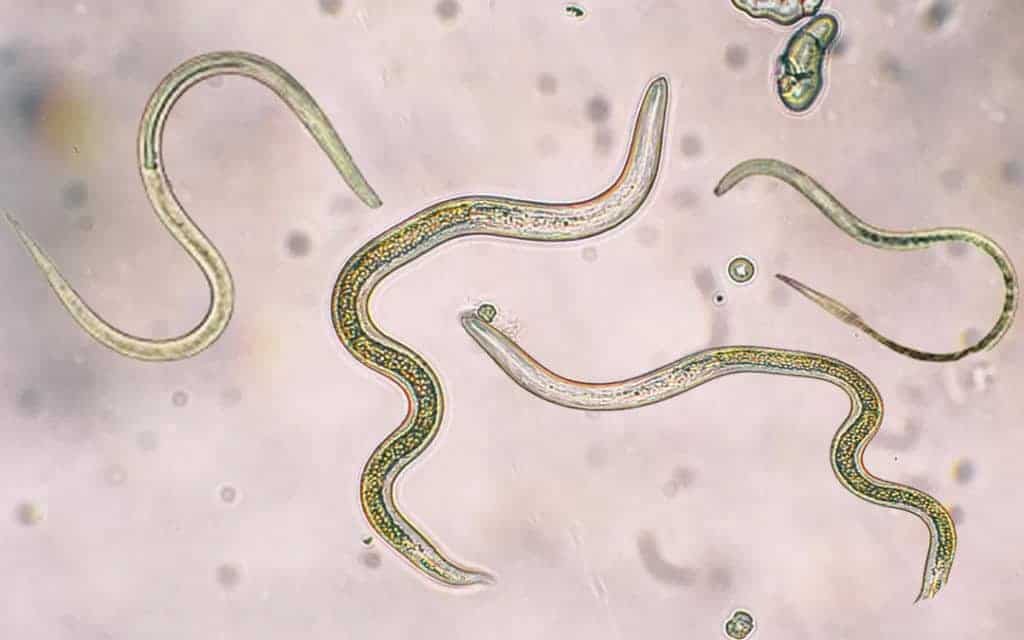
Why do Tortoises Get Worms?
Just like any wild animal, or indeed pet, tortoises don’t adhere to the same levels of hygiene that we do, and nor should they. Can you imagine toilet training a dog or trying to get your cat to wash its paws after catching a mouse?
It’s simply not feasible to expect animals to be as clean as us, but of course this does come at a price. Pets, including tortoises are prone to getting ailments associated with poor sanitation and contaminated food that people in developed countries rarely get.
When they do carry parasites, it can pose a health risk to both you/your family and your tortoise.

If you’ve got young children or can think back to your own childhood you’ll be familiar with the problem of worms. Young children being lax in their hygiene are prone to getting worms, and the same is true for tortoises.
How do Tortoises Get Worms?
Whether it’s through consuming contaminated food, or ingesting contaminated substrate, there are many transmission routes for worms to infect the digestive tract of your tortoise.
Depending on the environment in which you keep your tortoise, your tortoise may develop problems with worms quickly, or over a long period of time.
For example if contaminated feces is present and not regularly disposed of it can be a breeding ground for worms which can then reinfect the tortoise over and over again. In this case the worms are more likely to be noticable, either visibly in fresh feces, or when a sample is taken by a vet for analysis.
On the other hand a regularly cleaned tortoise (and tortoise enclosure) will minimise the chance of infection, although it might not eradicate it altogether, so you might find your tortoise has worms but at a level that isn’t of any major concern.
Some people even believe that a small number of worms in a tortoise’s gut can actually be beneficial to the digestion of the tortoise’s food by assisting with the digestive process. However this is a fringe theory, and has yet to be proven scientifically.
How do You Know if Your Tortoise Has Worms?
If you can actually see worms in your tortoise’s poop it probably indicates that the parasites are well established in your tortoise’s gut. Typically they resemble little white threads, although their appearance will vary depending on the specific worm type.
More often than not however, worms won’t be visible in your tortoise’s poo, and the only way to be sure will be to take a sample for analysis to your local vet. Alternatively there are services that allow you to send a sample in the post for analysis.
In either case it’s important to provide as fresh a sample as possible and ensure it gets to where it will be tested as soon as possible, using a first class post of sending by mail.
It’s considered good practice to have your tortoise tested for worms every year, or if you’ve just bought them, have them tested straight away especially in advance of housing them alongside other tortoises.
It’s best to have your tortoise tested for worms during the summer months; as any treatment required will potentially knock their immune system out of kilter. You want to be sure they’re fighting fit again in time for hibernation!
Visible Symptoms on The Tortoise
Because having parasites living in the digestive tract can be quite debilitating for a tortoise, you may notice yours being noticeably lethargic or being reluctant to eat or drink. This coupled with bouts of diarrhea and vomiting can be life threatening if left untreated.
Some worms also have the potential to infect other parts of the tortoise besides the digestive tract, including the lungs. So you might even notice your tortoise struggling to breath, or making unusual sounds when breathing, which can again be very dangerous unless investigated.
Are There Different Types of Worms Tortoises Can Catch?
There are several broad varieties of worm that your tortoise might become infected with (or already be infected with.
There are broadly speaking two sub-types that can infect your tortoise
Indirect Lifecycle Worms
- These can only hatch in the gut of your tortoise having been ingested by a intermediate host such as a snail or slug.
- Example of Indirect Lifecycle Worms are roundworms (or nematodes) and despite their convoluted path to infection, they account for the vast majority of worm infections in tortoises. What makes them a particular nuisance is the amount of nutrition they are able to steal from the tortoise’s gut – up to 40% in some cases
Direct Lifecycle Worms
- These breed and hatch with the tortoises’s gut directly and can therefore thrive a lot more easily, stealing valuable nutrition from food in the tortoise’s gut as a result.
- Examples of Direct Life Cycle Worms include Hookworms and Pinworms, and although rarer than roundworms can be even more harmful to the tortoise. Because they’re able to continually reinfect the tortoise directly, they can quickly overwhelm the digestive tract of the tortoise
How Do I Treat My Tortoise if He/She Has Worms?
If you suspect your tortoise has worms, and an analyzed stool sample proves this to be the case, your veterinary practitioner will prescribe a treatment to eliminate the worms from your tortoise’s system. This will vary depending on the parasite in question, and may be a single one off treatment, or a course that goes on for several weeks or more.
Whilst your vet should know exactly what course of treatment to provide (and as such the finer details are of little concern to us as owners) it is worth being aware of a few treatments that are actually toxic to tortoises, just in case you do happen to come across a vet who isn’t as well versed in tortoise medicine as perhaps they should be
The biggest issue is the prescription of medication readily prescribed (and hence readily available) to worm cats and dogs. Ivermectin (Ivomec) and Albendazole are both used for this purpose, but shouldn’t be used to treat tortoise’s as their toxicity to tortoises can prove fatal.
The most commonly prescribed medicine to treat worms in tortoises that is effective is Panacur (Fenbendazole). This deals with most of the common species of worms, although it doesn’t kill their eggs. Therefore ongoing treatment is usually needed until every trace of hatched worms has been eradicated.
Are There Any Long Term Health Implications?
Provided you introduce the right treatment as early on as possible, your tortoise should make a full recovery from a worm infection. However the more severe the infection and symptoms, the greater the possibility of long term issues, for example there may be persistent respiratory or digestive problems, at least in the short term.
The biggest concern is making sure your tortoise is looked after properly during recuperation. Worming treatments are by definition a form of poison, as it’s by poisoning that the worms that are eradicated.
We already know that incorrect dosages or the wrong type of medicine can be fatal to tortoises, so it shouldn’t be any great surprise to learn that even the correct dosages can severely weaken your tortoise.
It’s therefore of paramount importance to keep an extra close eye on your tortoise during recovery. This includes quarantining him or her from other tortoises or indeed other pets, maintaining extra stringent levels of hygiene in their enclosure, and making sure they are eating and especially drinking as they should be.
Regarding their enclosure in particular, I would keep the tortoise indoors on a tortoise table or enclosure during recovery as you have a lot more control over the cleanliness of this environment compared to your backyard, where there might be all manner of parasites lurking. When the tortoise hasa full bill of health this isn’t likely to be an issue, but in their weakened state is isn’t worth adding to the risk of reinfection
What Can I do to Prevent My Tortoise Getting Worms Again?
As with most ailments prevention is better than cure when it comes to worms, and as we know poor hygiene and unsanitary conditions are the source.
Whilst there’s no way to safely eliminate the conditions in which worms can thrive and infect your tortoise you can certainly promote cleaner conditions than you might otherwise.
First things first it’s important to keep the tortoise itself clean. Whilst you should be bathing your tortoise once or twice a week for the sake of water uptake, it’s also necessary to do so for cleanliness reasons.
You should bathe your tortoise in a separate container to the one located in your tortoise table or outside enclosure, simply so that any infected dirt or feces that washes off the tortoise can be easily disposed of without the risk of reintroducing infection.
Good housekeeping is everything when it comes to keeping parasites out of your tortoise enclosure. Making a point of clearing out dead or decaying food waste, and tortoise poo on a daily basis is important, as is replacing the water. Clearly the longer any liquid or food waste is left lying around the more chance of parasites festering and multiplying on them.
The other key item to keep an eye is the substrate in your indoor enclosure, or if you have an enclosed space in your outdoor enclosure. This should be regularly cleaned of debris and local areas of soiling should be replaced daily, whilst it should be replaced in its entirety every two weeks.
Just as an aside I believe tortoises kept indoors probably don’t stand as great a chance of becoming seriously infected with worms as those who live outdoors, for the simple reason that you have a greater level of control over their environment. It’s a smaller space to manage, and potential sources of infection are more easy to find and dispose of. Outdoors you have far more to contend with, from slugs to soil microbes.
This doesn’t mean I think you should keep your tortoise indoors forever of course! The benefits of a tortoise living outdoors far outweigh the negatives, however you just need to be aware of the increased risk or parasitic infection

